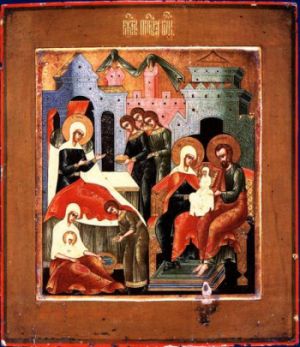Source: www.myocn.net
 As we strive to surrender our wills more and more to God, as we struggle to trust in God and to lean not on our own understandings (Proverbs 3:5-6), it’s important for us to be reminded of how God has cared for His people throughout human history. We can see this fact in so many places in the Holy Scriptures, but perhaps no more beautifully than in the person of the Mother of God. She is for us a part of the fulfillment of God’s plan for His people, and a magnificent image to us of how God cares for those who submit to Him.
As we strive to surrender our wills more and more to God, as we struggle to trust in God and to lean not on our own understandings (Proverbs 3:5-6), it’s important for us to be reminded of how God has cared for His people throughout human history. We can see this fact in so many places in the Holy Scriptures, but perhaps no more beautifully than in the person of the Mother of God. She is for us a part of the fulfillment of God’s plan for His people, and a magnificent image to us of how God cares for those who submit to Him.
The Theotokos as a fulfillment of God’s plan
As Christians, we would first and foremost say that God’s plan for mankind, expressed from the beginnings of the Scriptures, is for man to be with God. Jesus Christ is the fulfillment of God’s plan for fallen man to be healed. But in the fulfillment of that plan, many other pieces had to be laid, and none more important that she who was to be the Mother of the Messiah.
The woman who would be chosen to give birth to God Incarnate, to carry God within her womb, to nurse Him, to raise Him from a child, to teach Him and nurture Him, the woman who would be chosen for this privilege was an incredibly important part of God’s plan. It had to be the right woman. She would be bless-ed among all women and all generations (from Luke 1:42-55). And so when we speak of the Nativity of the Theotokos, the Fathers of the Church profoundly say that her birth is the “fullness of time” prophesied in the Old Testament. God told the prophets that the Messiah would come to save His people “in the fullness of time.” The Fathers teach us that the fullness of time would be fulfilled when the woman who would be worthy to be the Mother of God would be born. And so when the fullness of time was come, we celebrate the Nativity of the Mother of God.
What would be so special about one woman born of mankind, that she would be graced to be the Mother of God in the flesh? This is an answer, hidden in the mind of God. The Fathers point out her purity, her humility, her beauty, her virtue. But really, we look to her total submission to the will of God in all things; this is the single attribute that allows her to grow in all godliness and virtue.
The Theotokos as our example of submission to God’s will
The Theotokos gives herself to God unquestioningly from the time of her childhood. We know from the Tradition of the Church that her single desire was God-from the time she began to make decisions, her every decision was for God. In the Scriptures, we see several of these decisions:
-as a young girl (13 or 14 years old) she accepts the word of the Archangel Gabriel, and agrees to become the mother of the Messiah, knowing the incredible difficulties this task would bring;
-then she flees to Egypt with her young child and husband, as the Lord directed Joseph;
-she then returns with her young son, again, at the direction of an angel.
Her response to the Archangel Gabriel at the Annunciation is the characteristic response of her entire life to God-“Behold the handmaid of the Lord; be it unto me according to Thy word” (Luke 1:38). Whatever God willed became her will as well. And through her, we see what God brought to pass-God Himself was incarnate in her womb, God became man and shared in all that we are in order to bring us healing and salvation.
The Theotokos is our supreme example of godliness, we follow her example in all things, and we see in her that God will work all things for our salvation if we’ll only let Him. We never know how many others the activity of God in our lives may affect as well. Look at the Virgin Mary-she submitted to God’s will, and through her, mankind was offered salvation in the person of her Son, the Godman Jesus Christ. Today we prepare to celebrate the fullness of time for man’s salvation in the Birth of the Mother of God, and we remember that it was in her submission to the Lord (a submission we’re called to imitate), that God could work all things for the salvation of the human race.
Glory to Jesus Christ! Glory forever!















